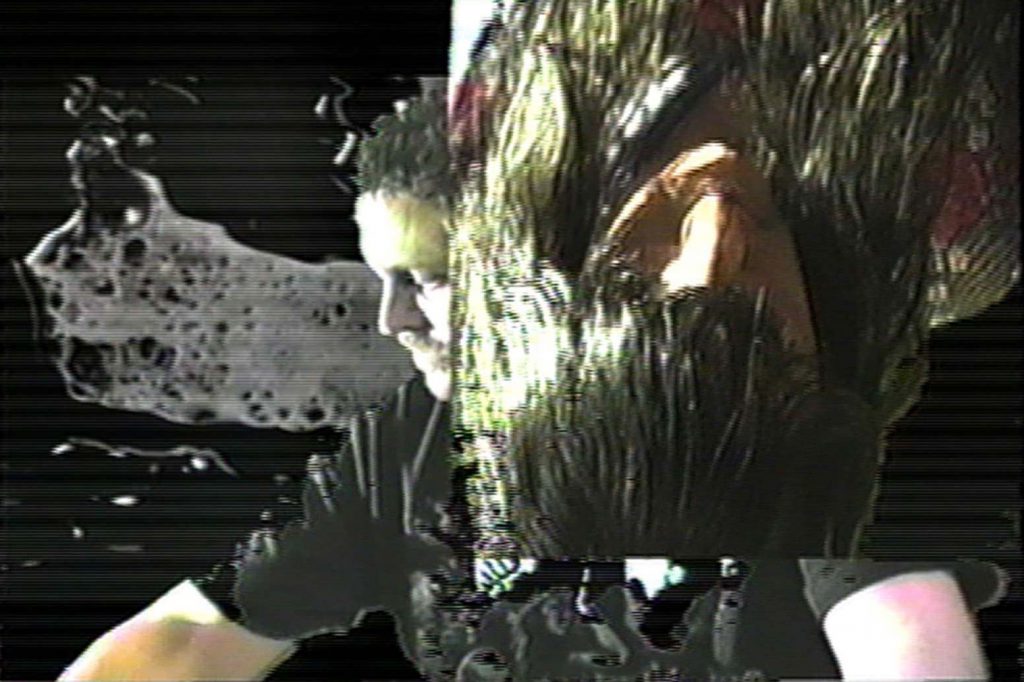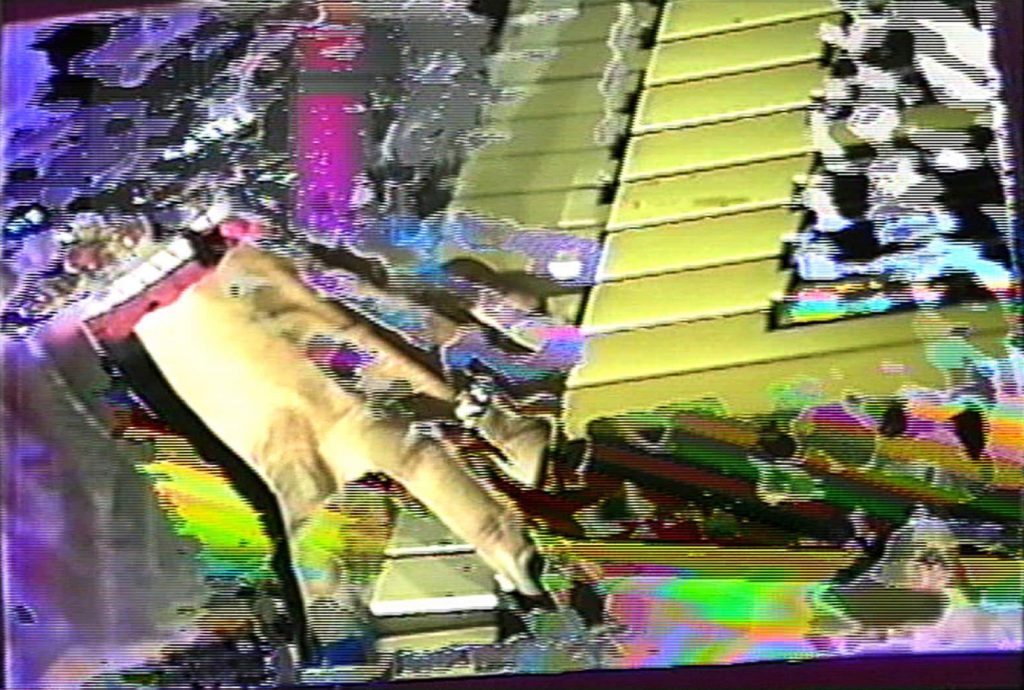Long distance poison
"Playing in Rivers of Electricity"
It’s rare to find bands or collectives who although are part of a scene or a network linked to an specific area and time frame - like the current thriving Brooklyn scene – don’t really fit in a label, description or movement. For Long Distance Poison sound is beyond genres or styles, it’s a kind of rite, a means to be transported to exterior dimensions not necessarily spatially but within the self. Nathan Cearley, Erica Bradbury and Casey Block are devoted to the sheer production of otherness through sound and electricity. I had the chance to talk with Nathan in his studio in Brooklyn.
DGC: How did LDP start?
NC: Erica and I started it. For some reason I ended up living in Nashville after living in Brooklyn for many years, which is weird… but we met in NY, she had a band here, I had a band there in Nashville but it was electronic so we didn’t fit in (laughs). Erica and I were both very much into soundtracks and specifically into horror films. We started hanging out, I flew here she flew there and over time we started thinking to do a project that somehow would resonate with the tone and sound of horror films. But that was the point of departure, and then things started to change quickly.

DGC: In what sense?
NC: Originally we were doing short pieces, more like songs, but after a while I got bored with songs, I really don’t like songs and I personally don’t like rhythm and melody because it’s really distracting to me. I want to hear sounds but don’t want to be distracted by pre-dictable melodic patterns...I want to listen and not react or predict.
DGC: Like in a traditional song with chorus and refrain?
NC: Yeah, when I listen to traditional songs where I can predict what is going to happen then my brain shuts off and I don’t listen anymore. And the same applies to beats and rhythm, unless it is dance music. But dance is even a different set of problems...
DGC: It’s very physical, corporal…
NC: Exactly. You aren’t listening, you are moving. So I became interested in emotion, and primarily emotion connected to the music that was influential to me when I was young--bands like Tangerine Dream and Popol Vuh and Nocturnal Emissions, but also slow heavy stuff like Earth, the Swans, the Melvins. To kind of make drony music that felt similar and wasn’t distracted by melody or rhythm or the concept of song. So we talked a lot about this and about making longer pieces since you don’t really have time to listen to something in 4 to 5 minutes. There’s not much passage to it.
DGC: What kind of experience do you aim or are looking for in those longer passages, in the experience of the music?
NC: For me when I want to hear something, I don’t want to think about it, don’t want to interpret it. Although feelings can change depending on the time and circumstances of a listening, I don’t believe that songs need to have one specific feeling. I want the song to be transportive. I don’t mean physically but rather sensorially and psychologically, to be mind altering, psychedelic. And I don’t want the melody to distract me and I don’t want rhythm because although it can be psychedelic, it is more externally physical and not psychological. I don’t want trance though dance; I want it through the sounds them-selves.
So I feel that it takes a certain time to let an experience work on you, to absorb you. So the piece follows a transformational process where you don’t end up the same way as you started.
DGC: There is a way to do rhythm but not necessarily patterned, I am thinking of Steve Reich for example… Do you think that has some kind of mind altering power?
NC: Yeah, absolutely, percussive and repetitive stuff can be mind altering as well but perhaps we should call that rhythmic noise rather than beats per se.
DGC: Right, you don’t necessarily use the rhythm as something used to hold the melody or structure the song or the experience.
NC: Right. A thing we decided was to work within a sound or note and try to explore its pos-sibilities and interiority. What we try to do is to work the whole room of a key or even note, the various harmonics of it, try to modulate it as much as possible and not change until we explore that space.
We play slow, we are not frantically doing things because we are listening as we play. Sometimes in the performances I am really playing for myself and learning about this song that is being created that is teaching me about myself, allowing myself to be transported, being less in control and more driven by it than its being driven by me.
DGC: Given the formal requirements of your pieces, what is the format you use to release your stuff?
NC: Well, CDs don’t mean anything to me, the way they sound and are packaged. We’ve done record albums with labels that would let us do what we felt like doing. For us the release is something itself, beautiful or unique or strange, odd… That’s why I am really interested in tapes in cassette culture. There is more thought provoking sound art in that world than there is to me in other parts of music. So yeah, that and records. I like working with cassette people because they are artists too. Focused on making weird music rather than being big musicians.
I hope that there is some kind of mystery towards music, because if everything is defined music is not too transportive, I mean you are already there from the very beginning, you know where you are going to go. There is some kind of mystery to tapes, some hiss…

DGC: Do you feel connected with a particular scene?
NC: We are kind of old fashioned in that sense, not too defined. We don’t fit into the post punk leather industrial world, we clearly don’t fit in the heavy metal scene either and be-cause we do really slow music, even though it’s electronic, we don’t really fit in Brook-lyn’s current electronic music scene which is really defined right now by techno and house revivalism. So we have and share the vibes but we don’t really fit in scenes. The only scene that has really been a home for us is the experimental noise world.
DGC: What is your work or composing process?
NC: For some reason there’s always three parts or passages, 3 territories. I start patching things, and something starts to happen, the territories are being sketched. Then Erica and Casey coming and showing them where I am at and they add their parts and everything becomes more like a whole--a whole formed as a negotiation between us and the alterity of the machines and sonic bodies. But the most important thing is always the sound and not our thoughts about what we want it to sound like. So I guess in a weird way the songs write themselves.
DGC: For what I see and heard, it seems that you are only interested in analog keyboards and modular synthesizers.
NC: We are all analog. I am not dogmatic against digital but for me there is much more other-ness that makes itself apparent in analog because it’s more organic, it’s the natural voltage process. The waveforms are more present. So it’s not just the aesthetics: digital has less accidents, it’s more controlled.
We started with keyboards but 2 or 3 years ago I begun using modular synthesis because the degree of relationship with the electricity and sound is more direct with modular syn-thesizers. It’s almost like playing in a river of electricity whereas the keyboard is like working with aqueducts, much more controlled. With the modular I feel more freedom.
DGC: How did you learn the technique? It looks pretty complex.
NC: It’s crazy, right? (laughs) When I was 16 I worked in a record store in a small town in the middle of the woods owned by a guy who had been in prog bands like in the seventies and was kind of a father figure and he gave me that (showing a vintage Minimoog) and learning synthesis on that gave me the foundations for knowing how to use something like this (the modular). And also when I went to college, Evergreen had a complex modular unit, a Buchla, in the musical department. We would go there in the middle of the night to play and get crazy…(laughs)